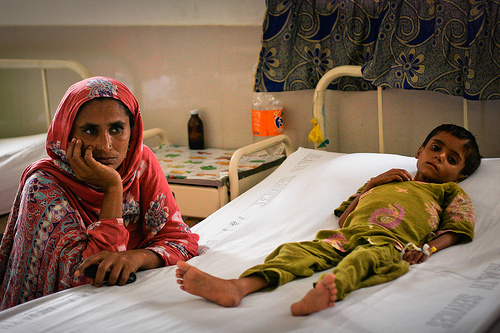LAHORE
The World Bank has called the Punjab government’s attention to focus on malnutrition, following the increase in cases of acute malnutrition in 12 underperforming districts, the latest communiqué available with Pakistan Today revealed.
The document underlines at least 60 per cent of children is identified with severe acute malnutrition in 12 underperforming districts, whereas, currently only around 10 per cent of children can receive any sort of nutrition service, registered for treatment.
Recalling reaffirmed commitment by Punjab government at the time of February 2016 WB President Visit, the document re-emphasised the need to take steps to look into malnutrition issues in Pakistan as well as of stagnant improvements. The communiqué underlines the steps needed for the proportion of children up to 24 months of age in the Punjab’s 18 low-performing districts receiving the basic package of nutrition services.
The communiqué asks the Punjab government for scaling up activity for providing micronutrients and de-worming, like vitamin A supplements for all children of 6-59 months, and zinc supplements (with ORS) for the treatment of diarrhea, iron and folic acid supplements for pregnant women, and expanding the delivery of behavior change communication, focusing on the prevention of malnutrition during pregnancy and in the first two years of life.
The government has been asked to consolidate existing fragmented training into comprehensive nutrition training by the level of service and clear policy directions from the government to all tiers on actions to be undertaken.
Ensuring the provision of essential nutritional services for children aged less than 24 months of age, government needs to develop activities by increasing number of districts covered by consolidation of existing fragmented trainings into a comprehensive nutrition training by level of service and clear policy directions from the government to all tiers on actions to be undertaken including (i) universal screening and counseling in the target districts; (ii) expansion of the coverage to uncovered union councils in the districts; (iii) Outpatient Therapeutic Program extension; (iv) establishment of Stabilization Centers with functional referral linkages.
According to estimates, the malnutrition crisis in Pakistan costs the economy 2-3 per cent of GDP per year (in comparison, the present energy crisis is estimated to cost 2 percent of GDP) by impairing health, growth and cognitive development, school readiness and learning outcomes as well as potential productivity and earnings and adults.
Furthermore, without an urgent response to significantly address malnutrition, the country will continue to experience this ‘demographic nightmare’ of a large population whose human capital potential is not fully realised, thereby resulting in unskilled, economically unproductive population which is left behind in a global economy that is increasingly requiring specialized skills.
While Pakistan’s social indicators for health, nutrition, and education are low and lag seriously behind other countries in the region, the country ranks among the lowest spenders on education and health in the region (each at less than 3 per cent of GDP).
In addition, provincial and district disparities in access to and quality of services have become an important concern since the delivery of most key services became a provincial responsibility with the adoption of the 18th amendment of the constitution in 2010.




